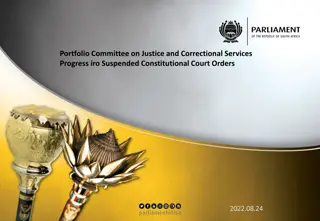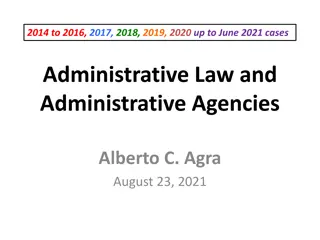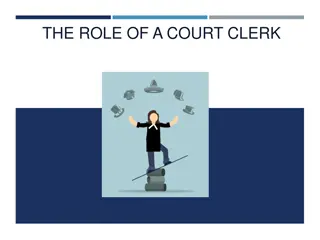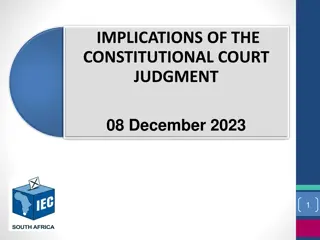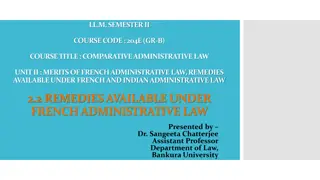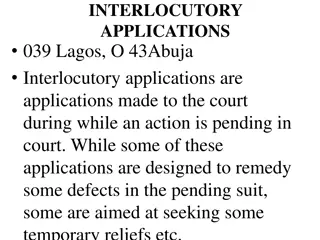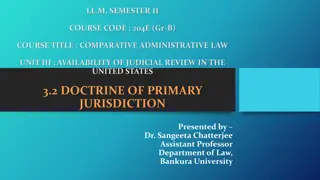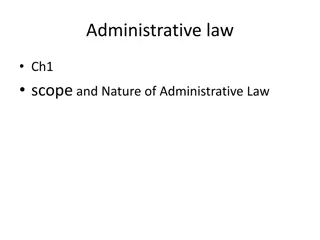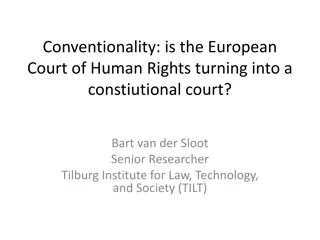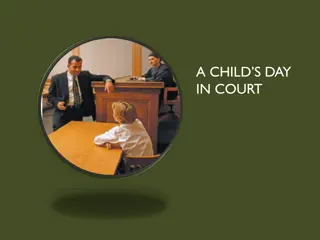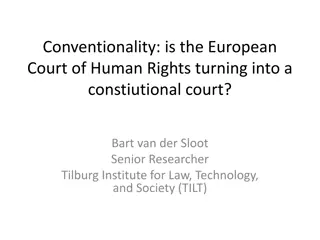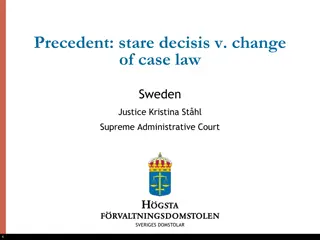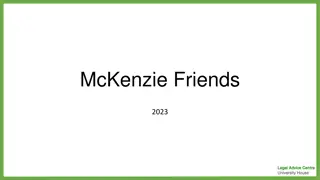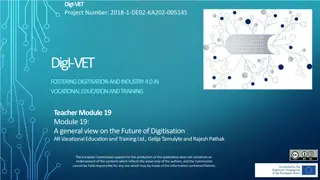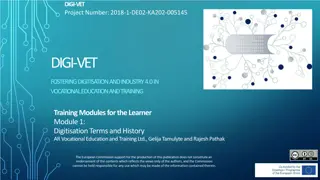Digitisation of Administrative Court Proceedings in Germany: Opportunities and Constitutional Limits
The digitisation of administrative court proceedings in Germany offers various benefits, but it must adhere to a legally secure basis and constitutional requirements. This process includes electronic communication with courts, the transition to electronic case files, digital publicity, and video hearings. While digital elements provide efficiencies, they must align with the constitution and ensure fair and transparent judicial processes for all parties involved.
Uploaded on Nov 14, 2024 | 0 Views
Download Presentation

Please find below an Image/Link to download the presentation.
The content on the website is provided AS IS for your information and personal use only. It may not be sold, licensed, or shared on other websites without obtaining consent from the author. Download presentation by click this link. If you encounter any issues during the download, it is possible that the publisher has removed the file from their server.
E N D
Presentation Transcript
Digitisation Digitisation of of Administrative Proceedings Administrative C Court Proceedings ourt Prof. Dr. Foroud Shirvani University of Bonn 27.05.2022 1
I. Introduction Numerous opportunities offered by digital elements in administrative court proceedings The process requires a legally secure basis and must be in line with the constitution Outline II. Status of the Digitisation of Administrative Court Proceedings in Germany III. Constitutional Limits IV. Conclusion 27.05.2022 2
II. Status of the Digitisation of Administrative Court Proceedings in Germany 1) Electronic communication with the courts 55a VwGO (Code of Administrative Court Procedure) (1) Preparatory documents, and annexes thereto, applications and declarations on the part of those concerned requiring to be in submitted writing, as well as information, statements, reports, translations and third-party declarations requiring to be submitted in writing, may be submitted to the court as electronic documents in accordance with subsections 2 to 6. Legally defined secure transmission channels Lawyers and public authorities are obliged to use electronic documents ( 55d VwGO) 27.05.2022 3
2) Electronic Case File The aim is an electronic workplace for judges Next step: electronic case files in administrative courts 55b VwGO (1) The procedural files may be kept in electronic form. The Federal Government and the Land Governments shall determine in each case for their remit by statutory instrument the time from when the procedural files are kept in electronic form. ( ) (1a) The case files shall be kept electronically from 1 January 2026 onwards. 27.05.2022 4
3) Digital Publicity Public access to all oral hearings and appropriate information of the public about the court proceedings are constitutionally required Digital live streams are currently inadmissible: 55 VwGO, 169 GVG (Courts Constitution Act) (1) Audio and television or radio recordings as well as audio and film recordings intended for public presentation or for publication of their content shall be inadmissible. 27.05.2022 5
4) Video Hearings Parties have a right to an oral hearing 101 VwGO (1) The court shall rule on the basis of an oral hearing unless otherwise provided. 27.05.2022 6
Participating via video conference is also classified as an oral hearing 102a VwGO (1) The court may permit those concerned, their proxy-holders and counsel, on request or ex officio, to be in another place during an oral hearing and to implement procedural acts there. The hearing shall be transmitted simultaneously in image and sound form to this place and to the courtroom. (2) The court may permit on request that a witness, an expert or a concerned party is in another place during questioning. ( ) 27.05.2022 7
5) Legal Tech Understood as the use of computer-based, digital technologies to automate the application of law in an algorithm-based manner Common practice in legal advice, not yet in administrative jurisdiction Not all decisions are suitable for the application of Legal Tech In certain areas Legal Tech could support the administrative judge 27.05.2022 8
III. Constitutional Limits 1) Judicial Independence The judiciary is characterised by its independence (Article 97 (1) GG (Basic Law)) and controlling function Art. 97 GG (1) Judges shall be independent and subject only to the law. 27.05.2022 9
To preserve judicial independence digital tools must not have the effect of controlling judicial work Therefore digital tools must not: Determine the order of processing Determine the timing and content of the decision Allow unlimited control of judicial work 27.05.2022 10
2) The Right to be Heard The right to be heard is a fundamental right to secure a fair procedure (Article 103 (1) Basic Law) Art. 103 GG (1) In the courts every person shall be entitled to a hearing in accordance with law. The right to be heard sets limits to digitisation in all procedural steps of the administrative court proceedings Legal Tech applications must not replace the interpersonal conversation in court 27.05.2022 11
3) Right to the Lawful Judge Art. 101 GG (1) Extraordinary courts shall not be allowed. No one may be removed from the jurisdiction of his lawful judge. The lawful judge may not be influenced in his decision- making by digital applications According to today s understanding, the lawful judge is considered a human judge 27.05.2022 12
IV. Conclusion 27.05.2022 13







